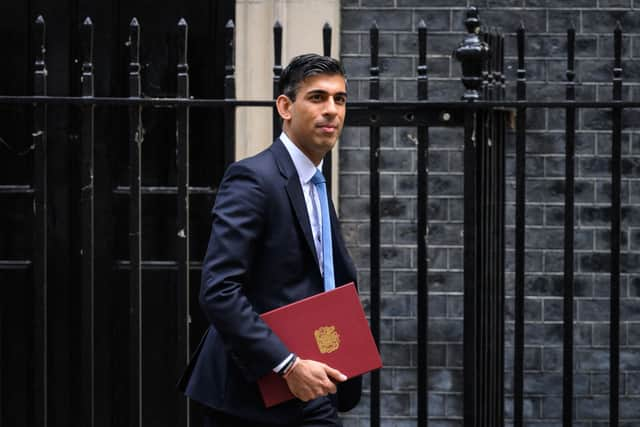Rishi Sunak considering inheritance tax cut as he tries to woo voters ahead of next general election - reports
This article contains affiliate links. We may earn a small commission on items purchased through this article, but that does not affect our editorial judgement.
and live on Freeview channel 276
Rishi Sunak is reportedly drawing up plans to slash inheritance tax as he looks to attract voters ahead of the next general election.
The Sunday Times reported that there are discussions at the highest level of government about cutting then ultimately abolishing the levy, which officials have labelled “the most hated tax in Britain”.
Advertisement
Hide AdAdvertisement
Hide AdDowning Street has sought to play down the speculation, but while appearing on broadcast interviews this weekend, Cabinet minister Grant Shapps has offered an insight into the views of some of those in Parliament - calling taxes on inheritance “deeply unfair” and “particularly punitive”.
Currently, inheritance tax is charged at 40% for estates worth more than £325,000, with an extra £175,000 allowance towards a main residence if it is passed onto children or grandchildren. A married couple can share this, meaning parents can pass on £1 million to their children without any tax being paid.
The vast majority of estates fall below the threshold, meaning most people do not pay a levy. According to the latest figures - which are for the tax year 2020 to 2021 - just 3.73% of deaths in the UK resulted in an inheritance tax charge.


Responding to the Sunday Times, Number 10 insisted that formal plans were not being worked on. But a senior government source told the newspaper that advisers had been “looking at abolishing inheritance tax as something that might go in the manifesto.” They then added however: “It’s not something we can afford to do yet.”
Advertisement
Hide AdAdvertisement
Hide AdShapps appeared to echo this sentiment, describing Chancellor Jeremy Hunt - who recently insisted any tax cuts were “virtually impossible” due to the state of public finances - as “a fiscal straitjacket”.
He warned that the public “will certainly have to wait for a budget or another event for the government to set out whatever the plans will be”, adding: “I’m in favour of all taxes being lower, but we’ve got to be fiscally responsible.”
If Sunak were to unveil any plans at the upcoming Conservative Party conference, which is due to kick off in Manchester next Sunday (1 October), it would likely be something of a crowd-pleaser. There has long been pressure within the Tories to change or scrap the charge, with former Prime Minister Liz Truss calling for it during her short tenure in 2022.
According to the Sunday Times, the Prime Minister would look to frame the policy as an “aspirational offer to voters” ahead of the next general election.
Advertisement
Hide AdAdvertisement
Hide AdLabour has hit out at the Conservatives over the reports, with the party’s shadow Treasury chief secretary Darren Jones commenting: “One year ago Liz Truss trashed the economy with unfunded tax cuts. Now, Rishi Sunak is doing what Liz Truss wants.”
He argued that abolishing inheritance tax - which he said 96% of people “never” pay – amounts to “an unfunded tax cut of £7.2 billion per year.” The MP added: “The biggest threat to the economy is the Conservative Party.”
Jones and Labour have written to Chancellor Hunt, demanding answers on how any change - or eventual abolishment - might be paid for out of the Treasury’s already dwindling budget.
Comment Guidelines
National World encourages reader discussion on our stories. User feedback, insights and back-and-forth exchanges add a rich layer of context to reporting. Please review our Community Guidelines before commenting.
